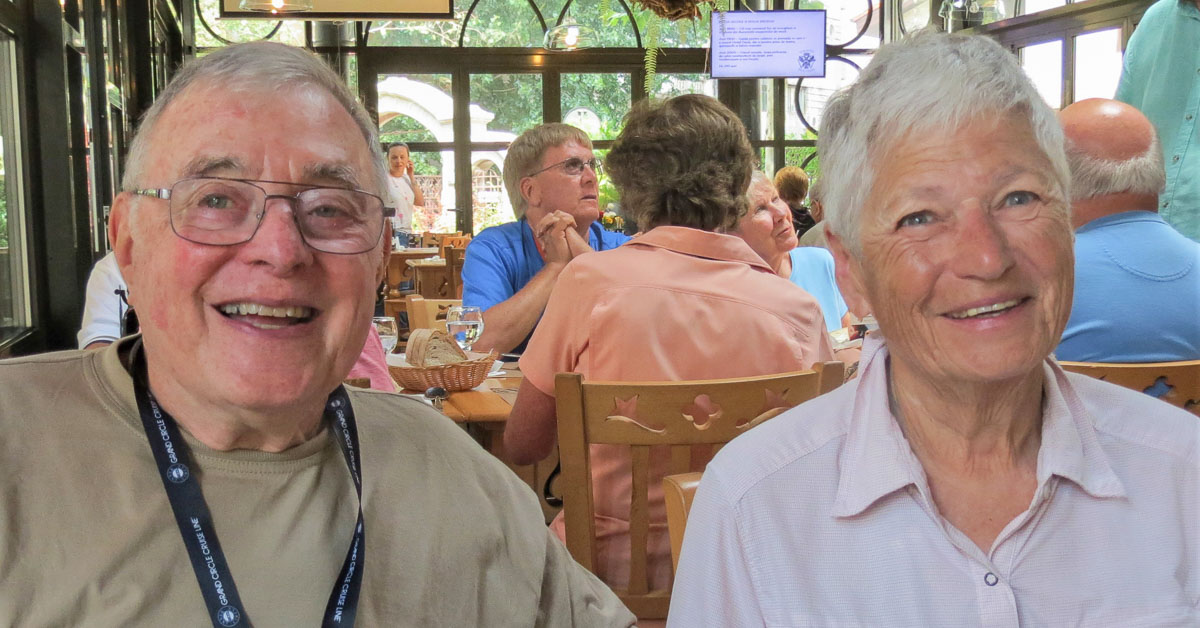The Impact of Giving: Helping Others to Help Themselves

Norman Klein and Harriet Sorocki Klein ’60
Photo courtesy of Norman and Harriet Klein.
Harriet Sorocki Klein ’60 was substitute teaching and raising a family of seven children with her husband, Norman, an aerospace instrument designer, when her brother-in-law Bob Falk approached her with a job offer. Bob, who held a master’s degree in vocational rehab from Hunter College, was starting an organization that would help people who had difficulty seeking jobs and wanted her to be the face of the company. Harriet had what Bob, who was married to her sister Sherry, called “unique family organizational skills.” Along with being a social justice activist, Harriet had also been an advocate for abused children, defending them in court as a guardian ad litem.
When Harriet accepted the job offer, the Kleins—who lived in Bellevue, Washington—had already hosted more than 20 foster children and exchange students and were active members of a group of interracial parents and children advocating for racial equality. And there was her own large, multicultural family. She was more than qualified to be the face of TRAC Associates, which focused on gaining employment for immigrants, refugees, homeless people, those who had been through the criminal justice system, and people who were otherwise disenfranchised.
“My wife believes strongly in helping others,” says Norman. “It’s very rewarding for her seeing people getting jobs and moving through society.” This sentiment is at the core of the Harriet Sorocki Klein ’60 Scholarship Fund recently established at Brooklyn College.
The Brooklyn Years
Born in Brooklyn in 1938, Harriet Sorocki was 8 years old when her mother died. She was placed into foster care until her father remarried. “I worked to support the family,” says Harriet. “I was also a daredevil. I jumped from roof to roof. Boys older than I was would follow me. I was fearless. I knew no limits.” After graduating from high school, she attended Brooklyn College. “It was virtually free,” says Harriet. “I could afford it. I could take the train to school. It was my chance for education.” After her sophomore year in high school, she met Norman Klein, working over the summer, at a vacation hotel in the Catskill Mountains.
“I was a busboy, and she was a waitress,” says Norman.
“He was the only person who could make me laugh,” Harriet adds about their summer romance. “No hidden agendas; what you saw was what you got.”
Born in 1935, Norman was a quintessential kid from Brooklyn. He was a Dodgers fan, played stickball in the streets, went to P.S. 122. He attended competitive Brooklyn Technical High School, then the City College of New York, earning a B.S. in mechanical engineering in 1958. He wasted no time in making Harriet his wife. “I graduated,” says Norman, “got my first job on Friday, and we were married on Sunday.” Harriet obtained a bachelor’s degree in fine arts with a minor in history. Norman added a master’s degree in mechanical engineering to his résumé the following year.
The couple lived on the sixth floor of a building across the street from Brooklyn College (“My wife was religious, so she would walk up all those flights on Sabbath,” Norman recalls.). Harriet taught middle school and vocational high school, focusing on students who had to repeat. “She was idealistic,” says Norman, and her students loved her: “Kids would come to our apartment, walk her to school.”
A New Family and Radical Change
The Cold War was in full swing, with the partition of Berlin into East and West sectors made permanent by the erection of the iconic wall. Norman went to work at classified Naval facility, analyzing Russian submarine signatures and training personnel how to identify them through their tracking system. He then took a job in Southern California working on inertial instruments at a large aerospace company involved with national defense. The New Yorkers pulled up stakes and moved across the country to the West Coast. Harriet found work as a substitute teacher, but one thing deeply concerned both Kleins about their new hometown.
“It was real John Birch Society country, real ultra-conservative,” says Harriet. “We had one friend who was married to a man who was part of the Nazi Bund.” Their time in Southern California was a time of radical change for the Kleins; they felt polarized. Harriet became an activist for social justice, becoming the head of a fair housing initiative and sitting on the board of the Council of Churches in Orange County.

In 1963, Harriet quit teaching; that same year, the Kleins adopted their eldest daughter, Elise, followed by one-year-old Joshua in 1965, and Daniel, the child of a Latino father and white mother, in 1967. After trying to have a baby for several years, in 1968, Harriet gave birth to their son Seth. Their second daughter, two-year-old Rachel, born to a Black father and Jewish mother, was adopted in 1970.
By 1971, Norman’s company was acquired by a firm in Seattle. “So, we moved,” says Norman, “with an army of kids.” Harriet honed her family organizing skills in their new home, giving birth to their second daughter, Heather, and finally adopting five-year-old Kim, the daughter of a Black father and Vietnamese mother. The couple continued their activism, heading a national conference on interracial adoption.
The Education Kick
If helping people succeed at life is at the core of the Harriet Sorocki Klein ’60 Scholarship Fund, education is at its heart. Longtime supporters of the college, the Kleins have consistently given to the school’s Annual Fund for more than three decades. They established this endowed scholarship on the occasion of Harriet’s birthday. “We’re 86 and 83,” says Norman. “We want to start this scholarship while we’re both still here.”
This type of philanthropy is not new. The couple recently endowed a scholarship in Norman’s name at City College (CUNY), and one in the memory of their son Daniel, who died in a motorcycle accident in 1993. “He skydived, he bungee jumped,” says Norman. “I had a hotline in my office because of his antics. And he was incredibly smart; they moved him up quickly.” To honor their son, the Kleins set up a scholarship in Daniel’s name at Evergreen State College in Olympia, Washington. “We met with Evergreen students from all sorts of backgrounds who told us about their ambitions. That’s what started what we call ‘this education kick,’” Norman adds.
Norman, who held various positions, from management to vice president, retired as general manager of Honeywell’s Instrument Systems Division in 2000. In 2008, after over two decades as president, Harriet retired from TRAC Associates. She had helped make it one of the most important social service organizations in western Washington, receiving the City of Seattle Mayor’s Small Business Award in 1996.
After Norman’s retirement, he became restless, and the Kleins began to travel. They have been to nearly 100 countries and foreign locales, including Madagascar, Papua New Guinea, Easter Island, Mongolia, and Iceland. They have adventured down the Amazon, Nile, Mekong, and Yangtze rivers. They’ve been to 16 African nations, where Norman has photographed a Voodoo ceremony in Benin, a hunt with pygmies in the Central African Republic, and wild animals on safaris, among other things. While the pandemic slowed down their global wanderings, they have made plans to get back to it this summer. Says Harriet, “In August, if we can, we are taking our four youngest grandchildren and parents to share with them the joys of a safari to Tanzania.”
Still, in retirement, Harriet and Norman are continuing their philanthropy, looking, with their family, to set up a GoFundMe or equivalent, to help supplement TRAC’s contract in finding housing for Afghan families by providing furniture and furnishings, among other things. “We still want to have a fulling purpose in life,” says Harriet.


